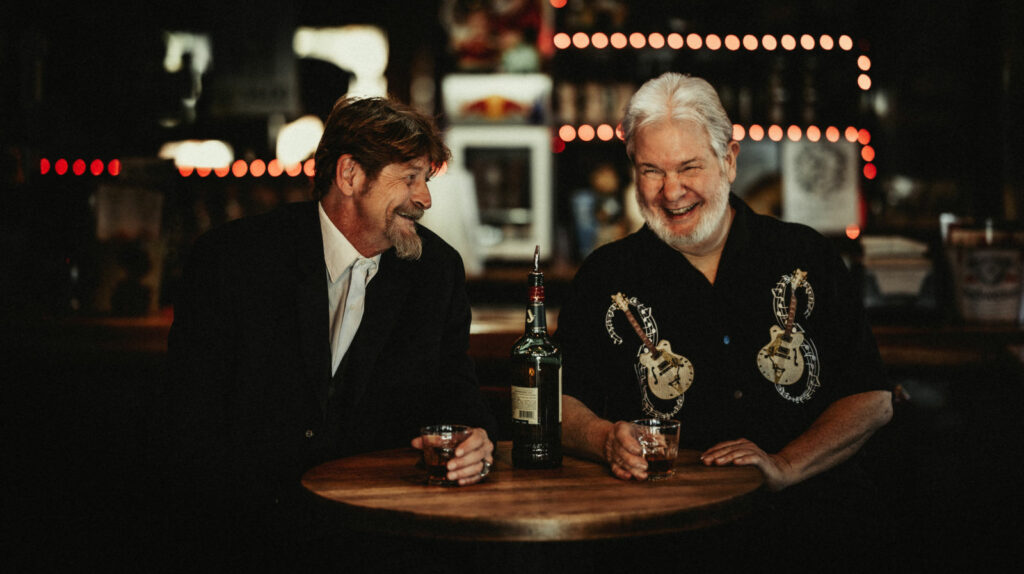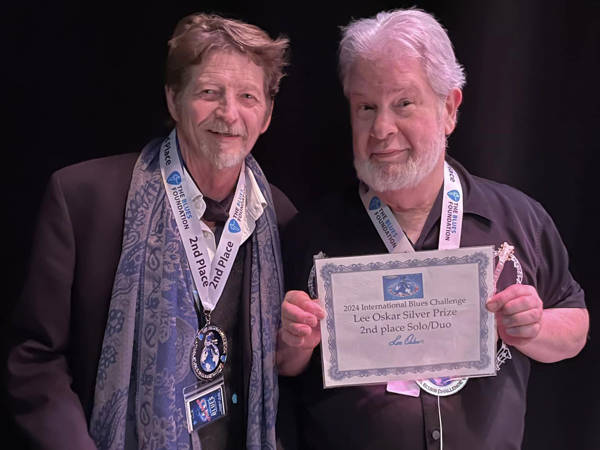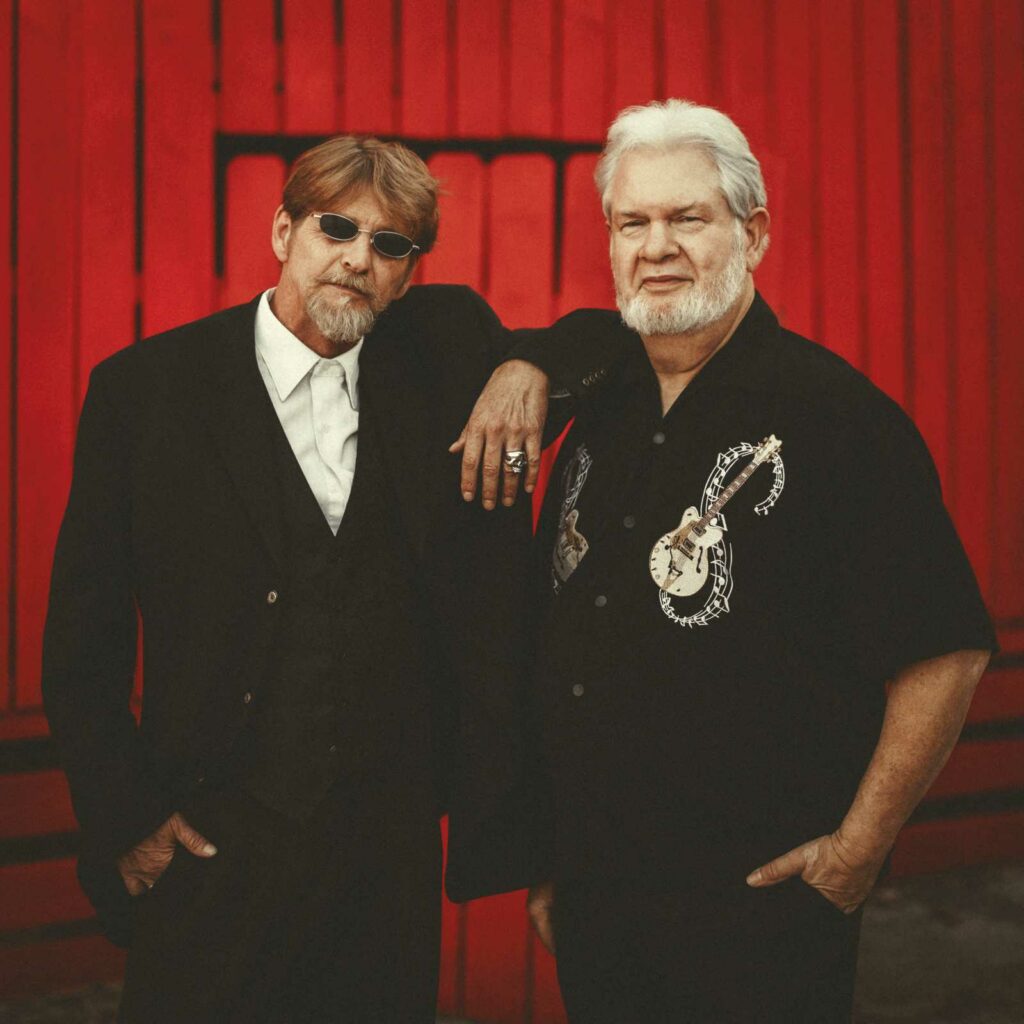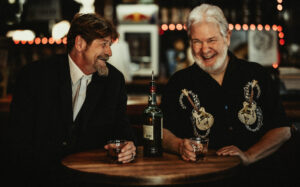by guest author Craig Smith, Membership Chair, KCBS
Kansas City Blues Society and BB’s Lawnside BBQ Celebrate 2024 Kansas City Music Honorees
Kansas City duo Drum & Dye placed second in the Solo/Duo Category of the 2024 International Blues Challenge (IBC) held in Memphis, TN last January. The IBC, produced annually by The Blues Foundation, is a worldwide search for blues talent that begins months before in various regional venues all over the world and culminates on Beale Street every year, typically in January. Blues societies worldwide, including the Kansas City Blues Society, hold regional challenges in up to three categories: Band, Solo/Duo, and Youth, with the winners performing at the IBC.
In addition to second place in the Solo/Duo Category, each performer also won highly regarded prestigious awards for their individual instruments. Blues harp player, John Paul Drum won the Lee Oskar Harmonica Award with what Lee Oskar himself declared the “highest score ever obtained for the award.” This award included a full set of 38 Lee Oscar harmonicas. Guitarist Bill Dye was awarded the Cigar Box Guitar Award, a custom-built cigar box guitar built by Matt Isbell. This level of success by any entrant is hard to achieve at the IBC.

I sat down with John and Bill over coffee one afternoon to discuss their trip to Memphis and their music careers. Below are some excerpts from that interview that include my questions and my summaries of their answers.
Q: Where is home and what got you to KC?
Bill Dye is from Lincoln, NE and developed his blues music chops around there until age 32. In 1982, after bouncing around a bit, including a stint with Luther Allison, he relocated to Kansas City to play with Colt 45, a band led by Tom Bark who is a well-known veteran of the KC music scene. He has made Kansas City his home ever since.
John Paul Drum is originally from Westphalia, KS, a small community about ninety minutes southwest of Kansas City. Following high school he came to KC for a bit, returned to east central Kansas to attend junior college at Iola, KS. In 1983, he returned to KC and ended up in Lawrence, KS, at Kansas University. John made KC his permanent home in 1987.
Q: What do you play and how old were you when you started?
John grew up with harmonicas all about the house, they were a constant in his upbringing along with an upright piano. His first instrument was the piano as a child followed by the clarinet in grade school. There was also a short stint on the glockenspiel mixed into his grade school band days. In his first year of junior college, at 19, John Paul turned his attention to the serious study of the harmonica, but it was not until 1983 that he discovered the blues music side of the harmonica, and he never looked back. He also has played guitar since he was nineteen.
Bill started playing the guitar at age 14 and it has been a constant in his life since that time. Bill played the harmonica and washboard in his high school band. He has also developed his talent over the years on guitar variations including the steel guitar and the viola caipira, a ten string Brazilian guitar.
Q: How about a quick highlight outline of your music career?
Bill was first serious about music in a high school rock band, The Rubber Band, which produced one album. Following high school, Bill played around Lincoln in several bands. He had a regular gig for many years in the Megatones, the house band at Lincoln’s long-time blues venue, The Zoo Bar. That ended in 1977 when he relocated to Austin, TX. He played mostly country gigs in Austin for two years. Bill then joined and toured with Luther Allison’s band until the end of 1980, which included one album. Following his time with Allison, he bounced around the Midwest for a couple of years then permanently relocated to Kansas City to join Colt 45.
In the years following Colt 45, Bill played with and made records with such Kansas City notables as Rich Hill, Ida McBeth, Bon Ton Soul Accordion Band, BCR, Dan Doran Band, Little Hatch, Lee McBee, and the Hatchlings. For a period, Bill formed his own western swing band, New Rocket Swinging, but the response was fairly limited, and the band didn’t last. At that point Bill began playing with John Paul and has been involved with most all his projects since. His primary current projects are Drum & Dye and The House Rockers.
John’s serious music career began to take shape in 1983 when he was asked by a band leader who was about to fire his singer if he could sing. Even though his actual vocal experience was limited, he jumped at the chance and pulled it off. One of the songs the band covered had a harmonica solo and, upon request, John easily learned the solo which marked the beginning of his professional harmonica career. But he was yet to find the blues. Around this time, he became acquainted with a group of friends that focused much of their musical attention on the blues. It was among this group of friends that he first heard the likes of Muddy Waters, Howlin’ Wolf and Elmore James. And it was here that he discovered some of his most significant harmonica influences such as Little Walter and Sonny Boy Williamson.
John Paul has shared the stage with many blues legends including Lee Oscar, John Mayall, Sugar Blue, Lazy Lester, Kim Wilson, Junior Wells and James Harman, not to mention Kansas City’s Elder Statesman of Blues Harmonica, Provine Hatch Jr., otherwise known as “Little Hatch.” John fronted several Kansas City bands including Swingin’ Swamis, Lonesome and Dangerous and The Cat Dancin’ Band after which, in 1990, he founded John Paul & The HellHounds. The eight years of the HellHounds advanced John’s skills and reputation as a top-tier musician with local, regional, national, and international appearances. John’s other bands included the Hatchlings and Flying Circus.
In addition to Drum & Dye, today, John also leads The House Rockers, a five-piece blues band passionately dedicated to authentic blues. He can also be found hosting jams and participating in pick-up bands and jams across the Kansas City metro.
Q: Can you give us some examples of your early musical influences?
John Paul’s early blues influences ranged from the “father of modern Chicago Blues” Muddy Waters to Howlin’ Wolf who led the way transforming acoustic delta blues into electric Chicago blues. Harp players like Sonny Boy, Little Walter and Sugar Blue showed John he could be less concerned with notes on a page and play what was in his heart, a lesson John still considers a turning point in his music career. In Kansas City, harmonica legend, Little Hatch, took John Paul under his wing, mentored him, shared his stage and band with him and left a deep profound impact on his career. Even though Little Hatch has been gone for over twenty years, the connection and gratitude John has for his mentor is clear when he speaks of him.
Bill’s early musical influences included the Beatles and the bands that constitute the British invasion. One of these bands, the Rolling Stones, was his first blues influence. Blues guitarists that left an early impression on Bill include Freddy King, B. B. King, Mike Bloomfield, Peter Green, Buddy Guy, and Otis Rush.

Q: Our attention now turns to the International Blues Challenge; can you give me an overview of this year’s event?
Both John and Bill provide the details. The event was held on Beale Street in Memphis, TN, this year from January 16-20. There were over seventy acts competing in the solo/duo category this year and over twenty venues along Beale Street hosting the events. Three rounds are held from Tuesday through Friday to produce the final acts that are in the finals on Saturday. John and Bill drove down and stayed at a bed and breakfast.
Q: Did you engage in activities or gigs outside of the competition?
Both artists replied “no” at the same time and went on to discuss Memphis’ lack of snow removal and the fact that the 4 inches of snow that fell right before the event paralyzed Memphis and Beale Street, leaving participants and attendees to fend for themselves in the snow. Additionally, the challenge landed in the middle of an intense cold snap that impacted much of the country. Boken water mains, water outages, closed restaurants, poor weather, and lack of snow management by the city plagued this year’s event.
Q: Do you like Beale Street?
John Paul immediately replied, “Not anymore, they have turned it into Blues Disneyland.” Bill just smiled and said that he had been there quite a bit and didn’t get a good feel for it this year with the poor weather.
Q: What are your thoughts about “challenge” among fellow musicians at the IBC?
Bill explains that behind the scenes there is generally a great deal of support and cooperation among musicians. There are examples of musicians helping one another, loaning each other instruments and equipment and helping others with problems. Even though there are exceptions, hyper-competitiveness is rare and, overall, he describes an environment of camaraderie and support among musicians.
John agrees and says the fellowship and goodwill among the musicians is rewarding. He adds that the overwhelming efforts behind the scenes include self-promotion, networking, and exposure. There are many relationships initiated and furthered at the IBC.
Q: A couple final questions to wrap things up; at this point in your life and career, if you could go back and talk to yourself, the young person that was just starting out, what would you say to him?
Bill responded by saying he has always wished he had learned how to read music better and that his advice to his earlier self would have been to consider more formal study of music and learn how to read music well.
John’s response was “you have your work cut out for you but stick to your guns and follow your heart, it’s worth it.”
Q: Final question, summarize in a few words what comes to your mind and heart when you look back over your entire career.
John Paul Drum: “I’m rewarded by the opportunity to play with my harmonica heroes and meet strange and unknown creatures and it’s been quite an interesting trip, I’m glad I went down this road.”
Bill Dye: “Touring Internationally was great, meeting and playing with some of my heroes is great and much of the reward is when I leave the stage and can say, “That was really good!”
Both men agreed that the most rewarding events of their music careers revolve around being recognized by some of their music heroes.

Come out and see Drum & Dye at BB’s Lawnside BBQ on August 17 when the Kansas City Blues Society celebrates the 2024 Kansas City music honorees, 7-10 PM. Hudspeth & Taylor and the Nick Schnebelen Band round out the line-up.

